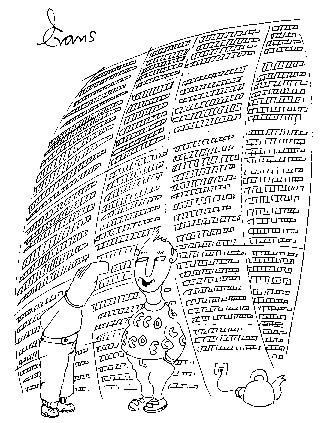So, a funny thing happened on the way home from the screening: I bumped into Paul Whitehouse, who has a cameo in Burke and Hare, and congratulated him on an extremely convincing tumble he takes down two flights of stairs (it hits just the right note, somewhere between the pantomime and The Exorcist). He told me that only one flight was given to the stuntman, which must have made his 90-second cameo a painful one.
But the truth is, a cameo of any sort strikes an ominous note in a film: it’s nice that someone has been having fun, to be sure, but it doesn’t follow that fun for everyone is now guaranteed. To me, it rather resembles the inclusion of comic out-takes over the closing credits — desperate to wring a laugh from a parting audience, the filmmakers will try anything: ‘Wait, wait,’ they plead, ‘you can’t just up and leave! You haven’t seen the best bits!’ A cameo is too often an attempt to elicit proof of life from the deathless hush of an auditorium. If the sight of Michael Winner (I kid you not) can dig a chuckle from the audience, imagine what Ronnie Corbett in military uniform will do! (Here’s an odd thing: without his spectacles he’s like a shorn Samson.)
But, pardon me, I’ve got ahead of myself. Burke and Hare is a black comedy which tells the tale of two Irish Williams, Messrs Burke (Simon Pegg) and Hare (Andy Serkis), who live in 1820s’ Edinburgh and fall into lucrative business supplying their top local surgeon Dr Knox (Tom Wilkinson) with fresh cadavers for dissection in the presence of his live student audience. Stiff competition (to coin a phrase) between Knox and his rival Dr Monroe (Tim Curry) means that demand for bodies is fierce and to my surprise (but it’s a true story, so I had to believe it) the newly dead are in short supply in 1820s Edinburgh. Our brace of lovable rogues are convinced by avarice (Hare) and passion (Burke) to expand their business and embrace production as well as supply, which unfortunately means turning to serial murder.
John Landis, Burke and Hare’s director, has made plenty of films over the past 30-odd years but his best four were made over a five-year period at the beginning of the 1980s: Animal House (1978), The Blues Brothers (1980), An American Werewolf in London (1981) and the awesome Trading Places (1983). There was also the groundbreaking video for Michael Jackson’s Thriller (in 1983), and since then there have been many, many movies, most of which we haven’t heard about.
This film feels as if he’s flown over for a bit of a holiday — an American director in Edinburgh — and if so I hope he enjoyed himself, because Trading Places earned him a holiday as far as I’m concerned, even if it was 27 years ago. (It was that good.) Yes, I can picture the bearded Mr Landis swaddled in his director’s chair and shouting, ‘Let’s have a blast!’ through a megaphone at 100-odd Scottish extras on a brutally cold day. And it works, up to a point: his direction is, naturally, extremely capable; the film looks and sounds terrific; it’s full of vim and vigour (at least, it is for an hour); it’s nice and snappy, with no scene lasting much over a minute; and even all those cameos stopping the action didn’t annoy me too much.
But black comedy is tricky, and this is neither black nor comic enough — it’s actually a bit gutless and anaemic which, given the subject matter, is quite an achievement. Like a village bonfire on Fireworks’ Night, it gives up all its energy in the first hour, going off with a roar and then fizzling out to nothing. It’s the script. There’s something too nicey-nice about it, too tippy-toes. It needs more meat. It feels as if it’s been picked over by a hundred cautious, calculator-carrying executives.
Oh, well. At least I learned a new word: ‘burking’. Mr Burke gave it to the English language, apparently, and it means ‘purposefully to smother and compress the chest of a victim’. Indeed, by one of those rare, happy coincidences I can put the word to use straight away in a sample sentence: ‘At this very moment I am being “burked” by a fit and enthusiastic army of autumn germs. Hack hack hack, ack-choo, splurff.’






Comments